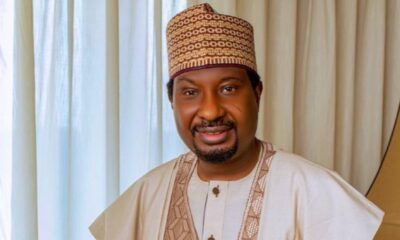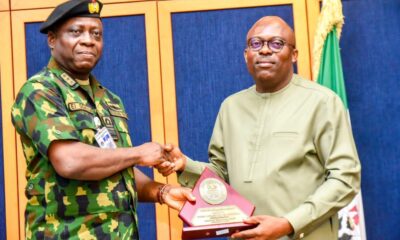Business
US Economic Growth Signals End Of Recession
The US economy grew at a 3.5 percent pace in the third quarter, the best showing in two years, fueled by government-supported spending on cars and homes. It’s the strongest signal yet that the economy has entered a new, though fragile, phase of recovery and that the worst recession since the 1930s has ended. Going forward, many analysts expect the pace of the budding recovery to be plodding due to rising unemployment and continuing difficulties by both consumers and businesses to secure loans. “This welcome milestone is just another step, and we still have a long road to travel until the economy is fully recovered,” said Christina Romer, President Barack Obama’s chief economist. “It will take sustained, robust … growth to bring the unemployment rate down substantially. Such a decline in unemployment is, of course, what we are all working to achieve.” The much-awaited turnaround reported Thursday by the Commerce Department ended the streak of four straight quarters of contracting economic activity, the first time that’s happened on records dating to 1947. It also marked the first increase since the spring of 2008, when the economy experienced a short-lived uptick in growth. On Wall Street, the news lifted stocks. The Dow Jones industrials gained nearly 110 points in midday trading and broader indices also rose. The third-quarter’s performance — the strongest since right before the country fell into recession in December 2007 — was slightly better than the 3.3 percent growth rate economists expected. Armed with cash from government support programs, consumers led the rebound in the third quarter, snapping up cars and homes. Consumer spending on big-ticket manufactured goods soared at an annualized rate of 22.3 percent in the third quarter, the most since the end of 2001. The jump largely reflected car purchases spurred by the government’s Cash for Clunkers program that offered a rebate of up to $4,500 to buy new cars and trade in old gas guzzlers. The housing market also turned a corner in the summer. Spending on housing projects jumped at an annualized pace of 23.4 percent, the largest jump since 1986. It was the first time since the end of 2005 that spending on housing was positive. Purchases of home furnishings and appliances also added to economic growth. The government’s $8,000 tax credit for first-time home buyers supported the housing rebound. Congress is considering extending the credit, which expires on November 30. The collapse of the housing market led the country into the recession. Rotten mortgage securities spiraled into a banking crisis. Home foreclosures surged. The sector’s return to good health is a crucial ingredient to a sustained economic recovery. A top concern is whether the recovery can continue after government supports are gone. Many economists predict economic activity won’t grow as much in the months ahead as the bracing impact of Obama’s $787 billion package of increased government spending and tax cuts fades. The National Association for Business Economics thinks growth will slow to a 2.4 percent pace in the current October-December quarter. It expects a 2.5 percent growth rate in the first three months of next year, although other economists believe the pace will be closer to 1 percent. Romer, in remarks last week said the government’s stimulus spending already had its biggest impact and probably won’t contribute to significant growth next year. Brisk spending by the federal government played into the third-quarter turnaround. Federal government spending rose at a rate of 7.9 percent in the third quarter, on top of a 11.4 percent growth rate in the second quarter.
Maritime
Shippers’ Council Registers 160 Port Operators

The Nigerian Shippers Council (NSC) says it has registered 160 Port stakeholders into its Regulated Port Service Provider and Users platform since the initiative began in 2023.
Executive Secretary, NSC, Mr Pius Akutah, made the disclosure on the sideline of a sensitisation programme by the commission for port operators in Lagos, with the theme, “Regulated Port Service Provider and Users”.
Represented by the Director, Consumer Affairs, Chief Cajetan Agu, Akutah emphasised the significance of the programme for stakeholders.
He said the sensitisation programme was the second edition after its commencement during the last quarter of 2023.
The Secretary said the 160 registered port operators consist of agencies, terminal operators, shipping companies, individual port users as well as service providers.
“We invited the ports stakeholders for enlightening them on the processes for online registration of Regulated Port Service Provider and Users.
“We have demonstrated to them how to register and how to make payment and we were able to present before them the various categories of the registration.
“The rate of payment is also in the registration. The payment of each group depends on the operation. A shipper pays N30,000, terminal operators and shipping companies pay N300,000, truckers also pay N30,000, while some pay N50,000 and N100,000.
“The Council was able to intimate them on the benefits, because port users benefit more as we help to interface on reducing port charges from time to time”, Akutah said.
He said that there was a need to continue to work with port operators to stop delays and eliminate high costs to make the port efficient.
Also speaking, the Deputy Director, Stakeholders, Service, NSC, Mr Celestine Akujobi, said “the sensitisation exercise was important for the council to enable us bring all the port stakeholders together”.
According to him, this is to avoid challenges during the implementation of the council’s responsibilities.
“By the time we introduce sanctions on defaulters, no operators will complain that he or she is not aware of the registration.
“I’m happy with the turnout of this sensitisation. This shows that the operators are well informed of the statutory friction of the council as the port regulator.
“The final implementation will commence as soon as we discover that all the operators have keyed into the portal.
“We are engaging other ports across the country and we’re hopeful that before the last quater of 2024, the council will implement sanctions on defaulting operators”, Akujobi said.
Earlier, Vice Chairman, National Association of Government Approved Freight Forwards (NAGAFF), Dr Ifeanyi Emoh, said port challenges were enormous, adding that they originated from some of the government agencies.
Emoh urged the council to look into regulating other government agencies, so that there could be a window through which they can collect port charges collectively instead of indiscriminately.
By: Chinedu Wosu
Business
Chivita, Hollandia Reward Outstanding Trade Partners At Annual Conference

Chivita| Hollandia (CHI Limited) leading fruit juice and value-added dairy manufacturer in Nigeria has rewarded its long standing distributors at the recently held 2024 Distributor Conference. The event with the theme, “Break Boundaries Exceed Expectations” served as a platform to recognise and reward the exceptional contribution of the distributors and wholesalers who play a critical role in Chivita|Hollandia (CHI Limited) success and business goals for the year.
The Distributor Conference was held in two sessions. While the morning session featured keynote addresses, industry insights and brand immersion experience, the evening session was a cultural display of elegance and funfair that culminated in the award presentation and recognition of the contribution the trade partners made to the company in the 2023 year under review.
A key highlight of the event was the award ceremony which acknowledged outstanding trade partners in various regions across the country. The awards recognized commitment, dedication, and outstanding performance in areas of sales growth, brand promotion, and market expansion.
Eelco Weber, Managing Director, Chivita|Hollandia (CHI Limited), stated that the company’s success story is incomplete without the strong partnerships it has built with trade partners. “Today, we celebrate not only the achievements, but the collaborative spirit that has made our growth possible” he said.
Bola Arotiowa, Chief Commercial Officer, Chivita|Hollandia (CHI Limited), in his statement revealed that, the event which was first of its kind will continue to be an annual meeting to enable the company work more closely with its distributors, share insights and action points, help the trade partners familiarize themselves with the company’s goals and objectives for each year, and serve as a driver for mutual success.
“Our distributors are the backbone of Chivita|Hollandia (CHI Limited). Their relentless efforts in distributing our products, promoting our brands, and expanding our reach across the nation is truly commendable. As the bridge between us and our valued consumers, it is very important to reward their hard work and dedication for being an essential part of the Chivita|Hollandia (CHI Limited) family. Together, we will continue to deliver great products to our conusmers which in turn will deliver value to them”, Mr. Arotiowa added.
Speaking at the conference, HajiyaBilikisuSaida, Chief Executive Officer of Smabirm Nigeria Limited, who won the Outstanding Distributor of the Year in North 1 region, and got a reward of two million Naira worth of Chivita|Hollandia (CHI Limited) products expressed delight at the company’s recognition, and stated that the awards served as a way to inspire distributors to do more and put in more effort, which in turn would help both the distributors and the company to grow.
Other outstanding performance distributors of the year rewarded with a two million Naira worth of Chivita|Hollandia (CHI Limited) stock include, Sunny Chuks Limited for East 1 region, MRS FA & Sons Limited for East 2 region, Hussakas Ventures for North 2 region, Rookee 1388 Ventures for Lagos 1 region, Pik N Pil Ventures for Lagos 2 region, FaithJoe Event Management Limited for West 1 region, and Progress Family Nigeria Enterprise for West 2 region.
The annual Distributors Conference aims to strengthen the bond between Chivita|Hollandia (CHI Limited) and its trade partners. This collaborative approach fosters mutual growth and ensures the continued success of the brands in the Nigerian market.
Business
AXA Mansard Backs Female-Owned MSMEs With N1.4m Grant

A global leader in insurance and asset management, AXA Mansard, has supported three female-owned MSMEs with business grants totaling 1.4 million to boost their operations.
This, the company said, is part of its commitment to women and the Medium, Small, and Medium-scale Enterprise (MSME) sector in the country.
The three businesses were successful at the International Women’s Day Pitch Competition, organised in partnership with SME 100 Africa in Lagos.
According to the Head of Marketing, AXA Mansard, Olusesan Ogunyooye, the competition, which is aimed at supporting female entrepreneurs in Nigeria, “is another way AXA is demonstrating its commitment to the causes of women and stimulating the MSME sector in Nigeria”.
The business pitch competition received numerous entries from women across different sectors, but after a rigorous selection process, shortlisted participants were selected to participate in the competition.
Ogunyooye said “the programme provided a unique opportunity for women from various works and socio-economic classes to showcase their innovative ideas and solutions in sectors such as food, tech, fashion, and fragrance, creating an atmosphere filled with excitement, enthusiasm, and a strong sense of community”.
He stressed the importance of investing in women, saying it is not just the right thing to do, but also aligns with AXA’s purpose of acting for human progress.
He explained that AXA believes the future of women should not be at risk, hence investing in their economic empowerment is a crucial part
-

 News3 days ago
News3 days agoJAMB Arrests Father For Impersonating Son At Exam Centre
-
Women3 days ago
The Desire Of Every Woman In Marriage
-

 Nation5 hours ago
Nation5 hours agoSenate Frowns Over Continued Depreciation Of Naira
-

 Business2 hours ago
Business2 hours agoChivita, Hollandia Reward Outstanding Trade Partners At Annual Conference
-

 Politics42 mins ago
Politics42 mins agoConstitution Amendment: Senator Barau Urges Stakeholders’ Collaboration
-

 Featured3 days ago
Featured3 days agoBe Firm In Fight Against Oil Theft, Fubara Tells CNS …As Navy Moves Training Hqtrs To Rivers …Seizes 14 Vessels In Three Months
-
Business3 days ago
Diri Tasks NCDMB, SPDC On Projects Completion
-

 Rivers5 hours ago
Rivers5 hours agoCustomary Jurisprudence: CCA President Harps On Fair Hearing Importance

